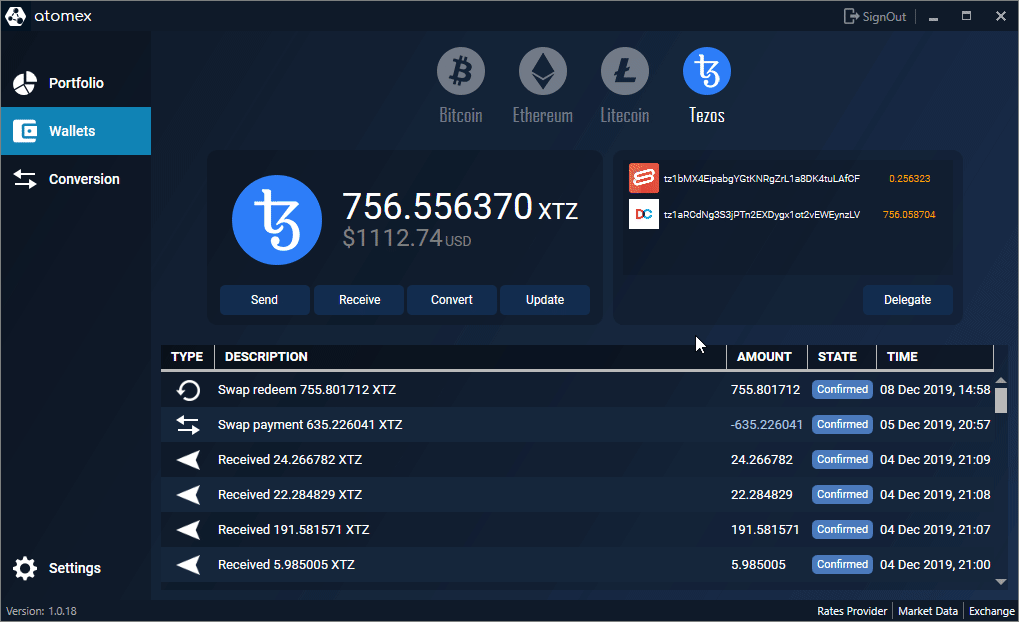Delegating
In this chapter, we will see how to delegate your coins. We'll use command lines or simple wallets' built-in options.
Self-baking lets a baker earn a higher yield but requires technical expertise and time to set up a baker node and run the baking software reliably with as little downtime as possible. By delegating Tezos tokens, a token holder avoids this process altogether but usually earns a lower yield. In the current protocol, token holders with less than 6,000 Tez can only bake by delegating to another baker.
Delegation is when you delegate your staking/baking rights to another person (the baker) rather than setting your Tezos node. It's a pretty helpful feature as it allows you to participate in staking and receive Tezos staking rewards without the necessity of maintaining a node.
In that case, all staking rewards are credited to the baker. The baker manually (or using automated tools) pays delegators (people who delegated to him) their share of staking rewards after charging some service fee.
Delegation in Tezos is safe! Your funds are neither locked nor frozen and do not move anywhere. You can spend them at any time and without any delay. Just keep in mind, you only delegate your rights; that's it.
In short, delegation is much better for an average user. Yes, Tezos bakers get slightly more staking rewards. Still, they pay for hosting; they spend time maintaining a node, and they have a risk of losing money on double baking (e.g. if the node was misconfigured). Thus, delegation is the most preferred and safe way for an average user to participate in Tezos staking.
CLI delegation
Both implicit accounts and smart contracts can have a delegate.
Implicit account
Setting or resetting the delegate of an implicit account is achieved by the following command:
octez-client set delegate for <implicit_account> to <delegate>
Where:
<implicit_account>is the address or alias of the implicit account to delegate.<delegate>is the address or alias of the delegate (which has to be registered).
To stop a delegation, the following command can be used:
octez-client withdraw delegate from <implicit_account>
Smart contract
Smart contracts can also delegate the tokens they hold to registered delegates.
The initial delegate of a smart contract can be set at origination using the --delegate option:
octez-client originate contract <contract_alias> transferring <initial_balance> from <originator> running <script> --delegate <delegate> --burn-cap <cap>
Once the contract is originated, the only way to stop or modify its delegation is by using the "SET_DELEGATE" Michelson instruction (see the Michelson documentation for more details).
Notice that only implicit accounts can be delegates, so your delegate must be a "tz1" address.
Funds in implicit accounts which are not registered as delegates do not participate in baking.
Built-in delegation
Wallets like Atomex, Exodus, Temple, etc. allow you to delegate your coins in a few clicks.
The main steps are as follows:
- Create a wallet
- Supply your wallet with Tez
- Click on "Delegation" part
- Choose a baker
- Choose the amount to delegate
- Start earning interests

That's it. The only thing you should worry about is choosing an excellent and reliable Tezos baker or delegation service.
Baking Bad, TzStats or Tezos Nodes allow you to browse through bakers. There are a few factors to consider when choosing a baker to delegate with:
Fees: How much of the rewards is the baker keeping?
Capacity: Each baker has a capacity of how many coins it can accept, which is based on how many coins it currently holds itself. A baker is "over-delegated" when it has exceeded the amount of delegation it can take.
Reliability & Responsiveness: Does this baker pay on time? Does this baker pay correctly? Will this baker respond to my questions about their services? Many bakers operate forums and chat rooms in which they engage with delegators.
Security: Is this baker's staking setup secured? Does this baker have a track record? Has this baker double-baked in the past and lost coins?
For more details, check out the List of Bakers chapter of the Baking module.